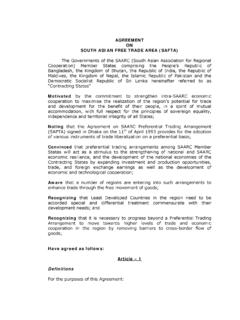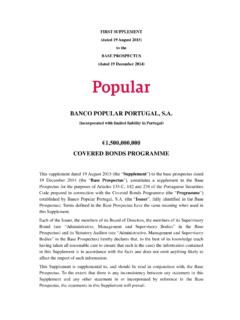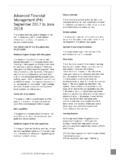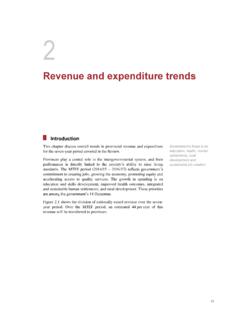Transcription of ASIA-PACIFIC TRADE AGREEMENT (formerly …
1 ASIA-PACIFIC TRADE AGREEMENT ( formerly known as the Bangkok AGREEMENT ) Text Rules of Origin National lists of tariff concessions Bangladesh o Concessions list China o General concessions o Special concessions India o General concessions o Special concessions Republic of Korea o General concessions o Special concessions Sri Lanka o General concessions o Special concessions Custom Notifications issued by Government of India No. 94/2006-CUSTOMS ( ) dt 31st August, 2006- Rules of Determintaion of Origin of Goods under the ASIA-PACIFIC TRADE AGREEMENT ( formerly known as the Bangkok AGREEMENT ) Rules, 2006. No. 89/2006-CUSTOMS dt 1st Sept., 2006 notifying the consolidated list of concessions granted by India to APTA ( formerly known as the Bangkok AGREEMENT ) member countries and LDC members of APTA. ECONOMIC AND SOCIAL COMMISSION FOR asia AND THE pacific Amendment to the First AGREEMENT on TRADE Negotiations among Developing Member Countries of the Economic and Social Commission for asia and the pacific (Bangkok AGREEMENT ) ASIA-PACIFIC TRADE AGREEMENT 2005 - 1 - AMENDMENT TO THE FIRST AGREEMENT ON TRADE NEGOTIATIONS AMONG DEVELOPING MEMBER COUNTRIES OF THE ECONOMIC AND SOCIAL COMMISSION FOR asia AND THE pacific (BANGKOK AGREEMENT ) ASIA-PACIFIC TRADE AGREEMENT PREAMBLE RECOGNIZING the urgent need to take action to implement a TRADE expansion programme among the developing member countries of the Economic and Social Commission for asia and the pacific (ESCAP)
2 Pursuant to the decisions contained in the Kabul Declaration of the Council of Ministers on Asian Economic Co-operation and within the framework of the Asian TRADE Expansion Programme which was adopted by the Intergovernmental Committee on a TRADE Expansion Programme created under the Kabul Declaration; GUIDED by the principles contained in the New Delhi Declaration adopted at the thirty-first session of the Economic and Social Commission for asia and the pacific ; REALIZING that the expansion of TRADE could act as a powerful stimulus to the development of their national economies, by expanding investment and production opportunities through benefits to be gained from specialization and economies of scale, thus providing greater opportunities of employment and securing higher living standards for their populations; MINDFUL of the importance of expanding access on favourable terms for their goods to each other s markets and of developing TRADE arrangements which promote the rational and outward-oriented expansion of production and TRADE .
3 NOTING that the international community has fully recognized the importance of encouraging the establishment of preferences among developing countries at the international, regional and subregional levels, particularly through the resolutions of the General Assembly of the United Nations establishing the International Development Strategy for the Second United Nations Development Decade and the Declaration on the Establishment of a New International Economic Order and - 2 - the Programme of Action for the Establishment of a New International Economic Order; the Concerted Declaration on TRADE Expansion, Economic Co-operation and Regional Integration among Developing Countries adopted at UNCTAD II; as well as Part IV of the General AGREEMENT on Tariffs and TRADE and Article V of the General AGREEMENT on TRADE in Services and decisions made in pursuance thereof; NOTING FURTHER that developing countries have already taken some major decisions intended to promote such type of preferential arrangements among themselves such as the Global System of TRADE Preferences; CONVINCED that the establishment of preferences among the developing member countries of ESCAP, complementary to other efforts undertaken in other international forums, could make an important contribution to the development of TRADE among developing countries.
4 The Governments of the People s Republic of Bangladesh, the People s Republic of China, the Republic of India, the Lao People s Democratic Republic, the Republic of Korea and the Democratic Socialist Republic of Sri Lanka HAVE AGREED as follows: Chapter I GENERAL PROVISIONS Article 1 Definitions For the purposes of this AGREEMENT , the following definitions shall apply: 1) Participating State means a State which has consented to be bound by the AGREEMENT by deposition of its instrument of accession or ratification with the Executive Secretary of ESCAP. 2) Original Participating States means the People s Republic of Bangladesh, the Republic of India, the Lao People s Democratic Republic, the Republic of Korea and the Democratic Socialist Republic of Sri Lanka. - 3 - 3) Developing member countries of ESCAP means those countries included in paragraphs 3 and 4 of the terms of reference of the Economic and Social Commission for asia and the pacific , including any future amendments thereto.
5 4) Least developed country means a country designated as such by the United Nations. 5) Products means all products including manufactures and commodities in their raw, semi-processed and processed forms. 6) Like product is a product which is identical to the product under consideration or, in the absence of such a product, another product which, although not identical, has characteristics closely resembling those of the product under consideration. 7) Tariffs means customs duties included in the national tariff schedules of the Participating States. 8) Border charges and fees means border charges and fees, other than tariffs, on foreign TRADE transactions with a tariff-like effect which are levied solely on imports, but are not indirect taxes and charges which are levied in the same manner on like domestic products.
6 Import charges corresponding to specific services rendered are not considered border charges and fees. 9) Non-tariff measures means any measures, regulations or practices, other than tariffs and border charges and fees, the effect of which is to restrict imports or to significantly distort TRADE . 10) Margin of preference means the percentage difference between the Most-Favoured-Nation (MFN) rate of duty and the preferential rate of duty for the like product, and not the absolute difference between those rates. Thus, Margin of preference = (MFN duty tariff rate conceded under the AGREEMENT ) u 100(per cent) MFN duty 11) Value of the concessions means the extent of benefits received by other Participating States from the tariff/non-tariff preferences given by each Participating State through its National List of Concessions agreed upon under this AGREEMENT .
7 In the case of tariff preferences, the value of the concessions shall be deemed to be preserved if margins of preference are maintained. - 4 - 12) Serious injury means significant damage to domestic producers of like or similar products resulting from a substantial increase of preferential imports in situations which cause substantial losses in terms of earnings, production or employment unsustainable in the short term. The examination of the impact on the domestic industry concerned shall also include an evaluation of other relevant economic factors and indices having a bearing on the state of the domestic industry of that product. 13) Threat of serious injury means a situation in which a substantial increase of preferential imports is of a nature to cause serious injury to domestic producers, and that such injury, although not yet existing, is clearly imminent.
8 A determination of threat of serious injury shall be based on facts and not on mere allegations, conjecture, or remote or hypothetical possibility. Article 2 Objectives The objectives of this AGREEMENT are to promote economic development through a continuous process of TRADE expansion among the developing member countries of ESCAP and to further international economic co-operation through the adoption of mutually beneficial TRADE liberalization measures consistent with their respective present and future development and TRADE needs. Article 3 Principles The AGREEMENT shall be governed in accordance with the following general principles: (i) The AGREEMENT shall be based on overall reciprocity and mutuality of advantages in such a way as to benefit equitably all Participating States; (ii) The principles of Transparency, National Treatment and Most-Favoured-Nation Treatment shall apply to the TRADE relations among the Participating States; (iii) The special needs of least developed country Participating States shall be clearly recognized and concrete preferential measures in their favour shall be agreed upon.
9 - 5 - Chapter II PROGRAMME OF TRADE LIBERALIZATION Article 4 Negotiation of Concessions This AGREEMENT may, inter-alia, consist of arrangements relating to: (a) tariffs; (b) border charges and fees; (c) non-tariff measures. Participating States may conduct their negotiations for tariff concessions in accordance with any one or a combination of the following approaches and procedures: (a) product-by-product basis; (b) across-the-board tariff reductions; (c) sectoral basis. The tariff negotiations should be based on the current MFN rates applied by each Participating State. Participating States shall enter into periodic negotiations with a view to further expanding this AGREEMENT and the fuller attainment of its aims. Article 5 Application of Concessions Each Participating State shall apply such tariff, border charge and fee, and non-tariff concessions in favour of the goods originating in all other Participating States as are set out in its National List of Concessions.
10 These National Lists of Concessions are attached as annex I, which is an integral part of this AGREEMENT . Article 6 Non-Tariff Measures Each Participating State shall take appropriate measures, consistent with its development needs and objectives, for the gradual relaxation of non-tariff measures which may affect the importation of products covered by its National List of Concessions. Issues relating to technical barriers to TRADE and sanitary and phytosanitary measures among Participating States shall be dealt with, as far as practicable, in accordance with the WTO provisions on these subjects. Participating States shall also make available to one another on a transparent basis a list of non-tariff measures existing on conceded products. Article 7 Special Concessions to Least Developed Country Participating States Notwithstanding the provisions of article 5 of this AGREEMENT , any Participating State may grant to least developed country Participating States special concessions which shall apply to all least developed country Participating States and shall not be extended to other Participating States.







